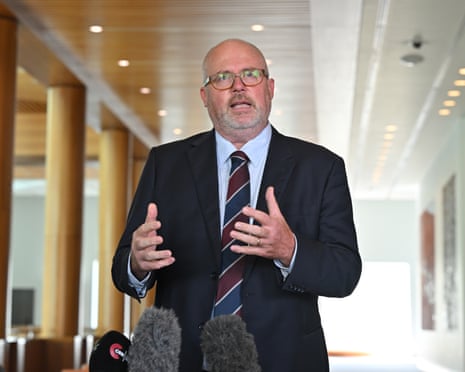Australia’s Imperative to Lead in AI: Insights from the Industry and Science Minister
Australia must actively embrace the advantages of artificial intelligence, or it risks becoming merely a link in someone else’s supply chain, warns the new industry and science minister, Tim Ayres. The Labor government intends to impose further regulation on this rapidly advancing technology. Recognizing that Australians remain skeptical about AI, Ayres emphasized the importance of open dialogue between employers and employees regarding the impact of automation in workplaces.
The minister stated that Australia has “no alternative” but to accept the technology and aim to become a global leader in its regulation and implementation. “It’s the government’s job to seize the opportunity and provide clarity for businesses and workers while ensuring confidence in our ability to manage potential risks,” Ayres told Guardian Australia. He added, “The Australian approach must focus on strategic regulation that benefits all Australians.” Ayres, promoted to cabinet last month, previously served as the assistant minister for manufacturing and trade.
As the new minister for industry, innovation, and science, Ayres is steering the Labor government’s flagship initiative, Future Made In Australia, which consolidates policies on manufacturing, energy transition, research, and business development. His immediate challenge revolves around AI policy. His predecessor, Ed Husic, initiated processes for developing local industry and establishing mandatory regulations, including discussions on a standalone AI act.
Though less than a month in office, Ayres asserts that the government is mapping out its legislative and regulatory responses, drawing insights from allied countries while keeping pace with the rapid evolution of technology. He believes a swift approach is essential for maximizing Australia’s benefits. “We must lean in; that’s how we will shape our digital future and assert our influence regarding technological advancements,” he stated. “The alternative is to remain passive and risk being at the mercy of someone else’s supply chain.”
Ayres believes that embracing AI can lead to considerable gains, particularly in productivity and economic growth, benefiting both white-collar and traditional blue-collar jobs. Reflecting on his experience in the manufacturing union, he noted that many workers realize that the biggest disruption to the labor market would be inaction that allows Australia to fall behind technologically. “I want firms to be mindful and ensure that the adoption of AI enhances job quality,” he said. “Our industrial relations framework is designed for proper consultation and engagement, enabling meaningful workplace discussions on these critical issues.”
Recently, the Business Council of Australia released a report advocating for Australia to become a world leader in AI, highlighting its potential to enhance productivity and improve living standards through economic growth. In contrast, the Australian Council of Trade Unions cautioned last December that one in three Australian workers could face job losses due to AI implementation. “The BCA report highlighted a significant level of skepticism among Australians regarding this wave of technology, which is not uncommon here,” Ayres remarked.
Every technological wave reshapes the labor market, he noted. The historically negative job impacts of such changes have often been counterbalanced by new investments and job creations. Ayres reaffirmed that the Labor government would persist with its Future Made In Australia agenda, emphasizing the need for a robust focus on critical minerals, iron, steel production, and enhancing manufacturing amid the transition to renewable energy. “We must build new factories and industrial capabilities, particularly in regions like central Queensland, the Hunter, and La Trobe, where future energy advantages intersect with industrial growth, driving benefits for local communities,” he stated.







